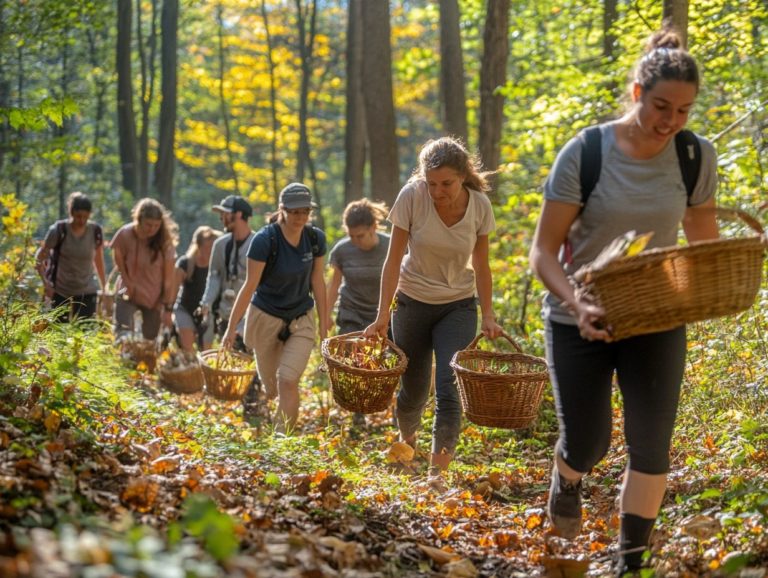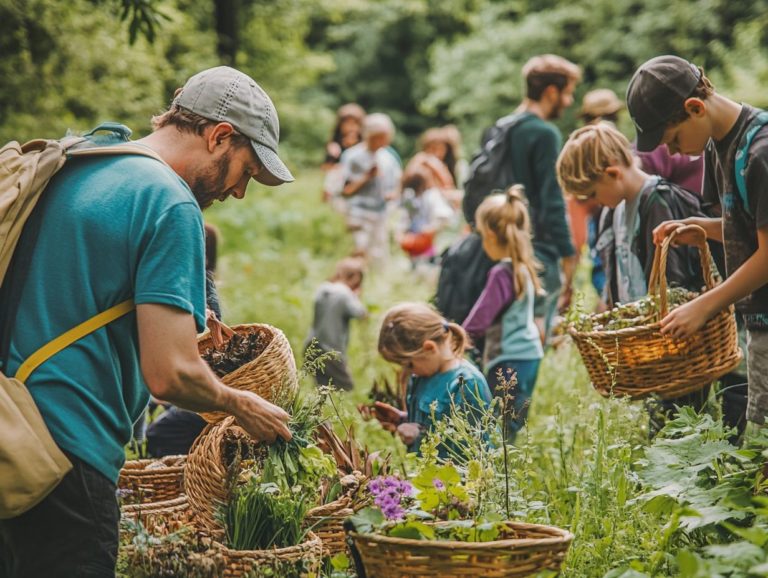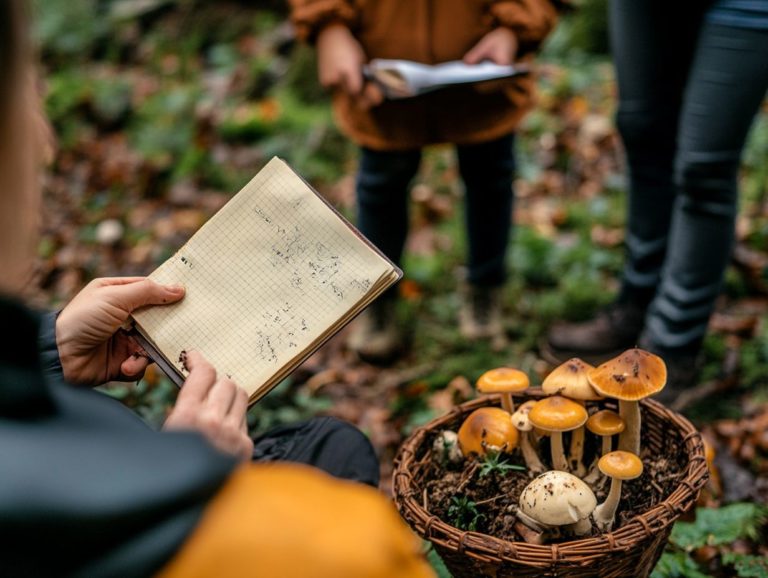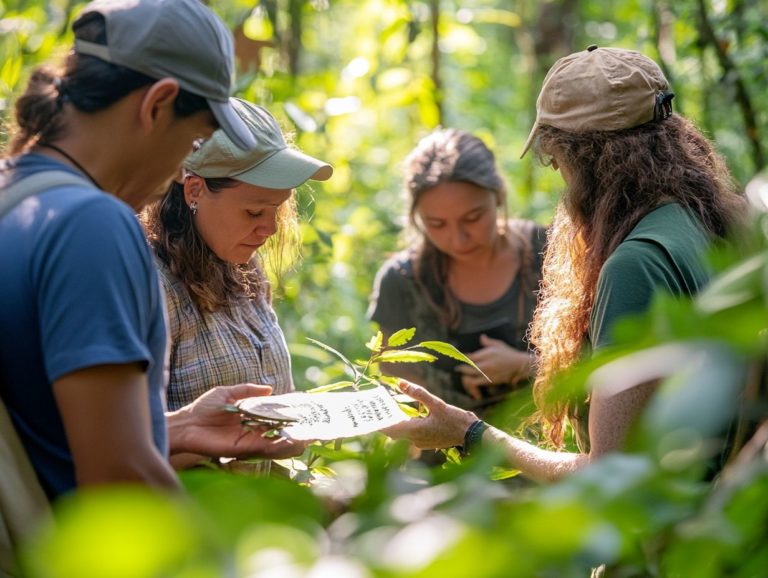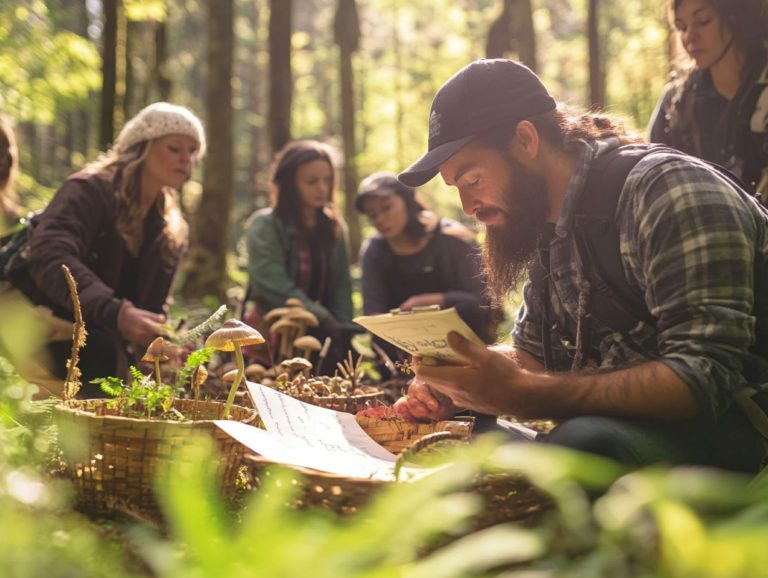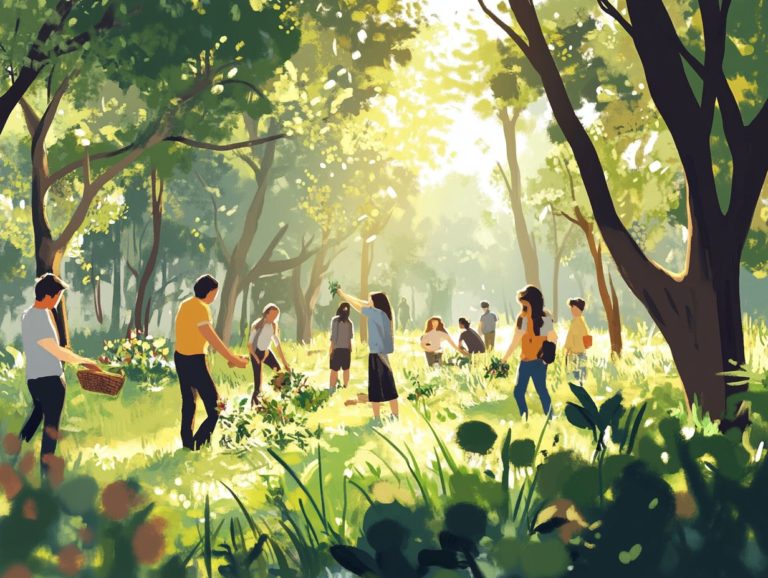5 Resources for Learning About Foraging Legislation
Foraging, including wild foraging, has become increasingly popular as you seek to connect with nature and source your own food. However, it s essential to familiarize yourself with the laws and regulations that govern this practice.
Discover five must-have foraging resources! These resources are designed to help you navigate the complexities of foraging legislation. From government websites to local foraging groups, you can find reliable information and learn how to forage responsibly.
Understand common misconceptions. Staying informed is crucial to ensuring a sustainable foraging experience. Discover how to enjoy foraging while respecting the rules that protect our local environment and ecosystems.
Contents
- Key Takeaways:
- 1. Government Websites
- 2. Non-Profit Organizations
- 3. Local Foraging Groups
- 4. Online Forums and Communities
- 5. Books and Publications
- What Is Foraging and Why Is It Regulated?
- Frequently Asked Questions
- What is foraging legislation?
- Why is it important to learn about foraging legislation?
- What are some common foraging restrictions?
- What are some resources for learning about foraging legislation?
- Are there any online courses specifically for foraging legislation?
- Is it necessary to obtain a permit or license for foraging?
Key Takeaways:
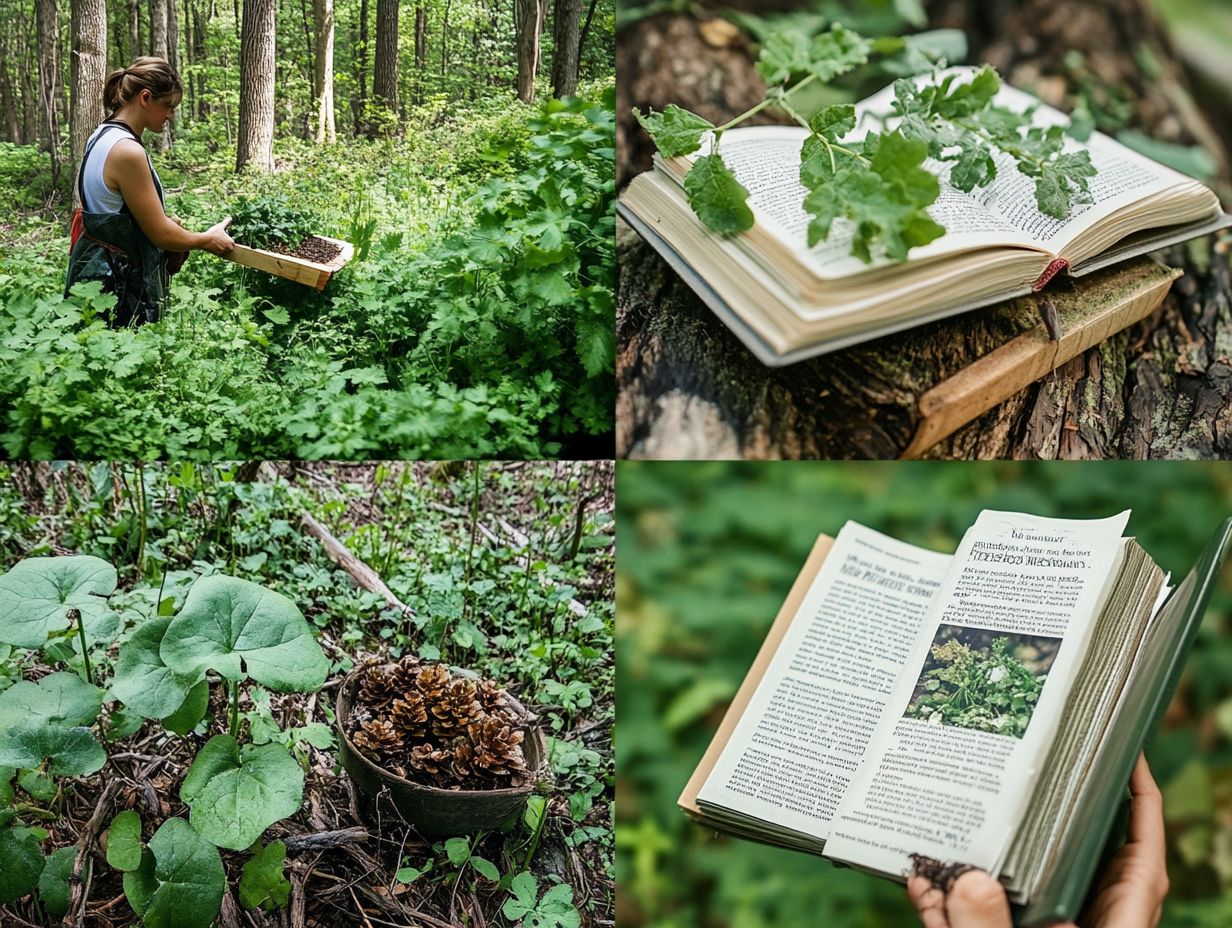
- Government websites provide reliable and up-to-date information on foraging laws.
- Non-profit organizations offer educational resources for responsible foraging.
- Join local foraging groups for a supportive community!
1. Government Websites
Government websites are crucial for wild food enthusiasts, as they provide essential information on the legalities of foraging, regulations, and resources that support ethical foraging in North Alabama and beyond.
These sites help you harvest wild edible plants sustainably. They also promote a deeper understanding of taking care of the environment.
Often, these platforms partner with local agencies to provide detailed foraging guidelines. This helps you identify safe and edible species while staying in compliance with local laws.
Resources such as the USDA’s website and state-specific portals like Alabama s Department of Conservation and Natural Resources offer comprehensive lists of edible plants and wild mushrooms, complete with responsible harvesting tips.
They also highlight the importance of community engagement. Workshops and foraging adventures connect you with experienced foragers and experts.
By taking advantage of these resources, you can enhance your foraging knowledge. You ll play a vital role in preserving local ecosystems through informed practices.
2. Non-Profit Organizations
Non-profit organizations focused on foraging offer invaluable resources and support for anyone eager to delve into the world of wild food and ethical foraging.
They place a strong emphasis on ethical foraging and environmental awareness, fostering community engagement and education along the way.
Organizations like Foraged and Found Edibles and the Wild Food Association dedicate themselves to educating novices about sustainable harvesting methods.
They ensure that ecosystems remain balanced. These organizations provide workshops, guided foraging trips, and online resources specifically designed for beginners, transforming the daunting task of identifying and gathering wild edibles into a more approachable experience.
These groups advocate for responsible practices. They stress the importance of leaving enough wild plants for wildlife and future foragers.
Through their efforts, they cultivate a deeper appreciation for local biodiversity. They equip learners with the skills necessary to make informed decisions about wild food consumption.
3. Local Foraging Groups
Local foraging groups in North Alabama offer a unique chance to improve your identification skills. Engage in hands-on activities focused on wild edible plants and mushrooms.
This experience enhances your knowledge and builds community, allowing for exciting foraging adventures amidst the region’s diverse ecosystems.
These groups organize workshops and guided foraging excursions, allowing you to connect with seasoned foragers who are eager to share their expertise.
By engaging with others who are equally passionate about sustainable practices, including mushroom foraging, you ll build valuable networks and acquire essential insights into safe and ethical foraging techniques.
Organizations like the North Alabama Foraging Guild often host seasonal community potlucks that celebrate foraged foods.
These events create a space for exchanging recipes and cherished traditions, including cooking wild food. Join fellow foragers for exciting adventures!
By joining such groups, you deepen your understanding of local flora and fauna while promoting environmental stewardship all while enjoying the abundant gifts of nature alongside fellow enthusiasts.
4. Online Forums and Communities
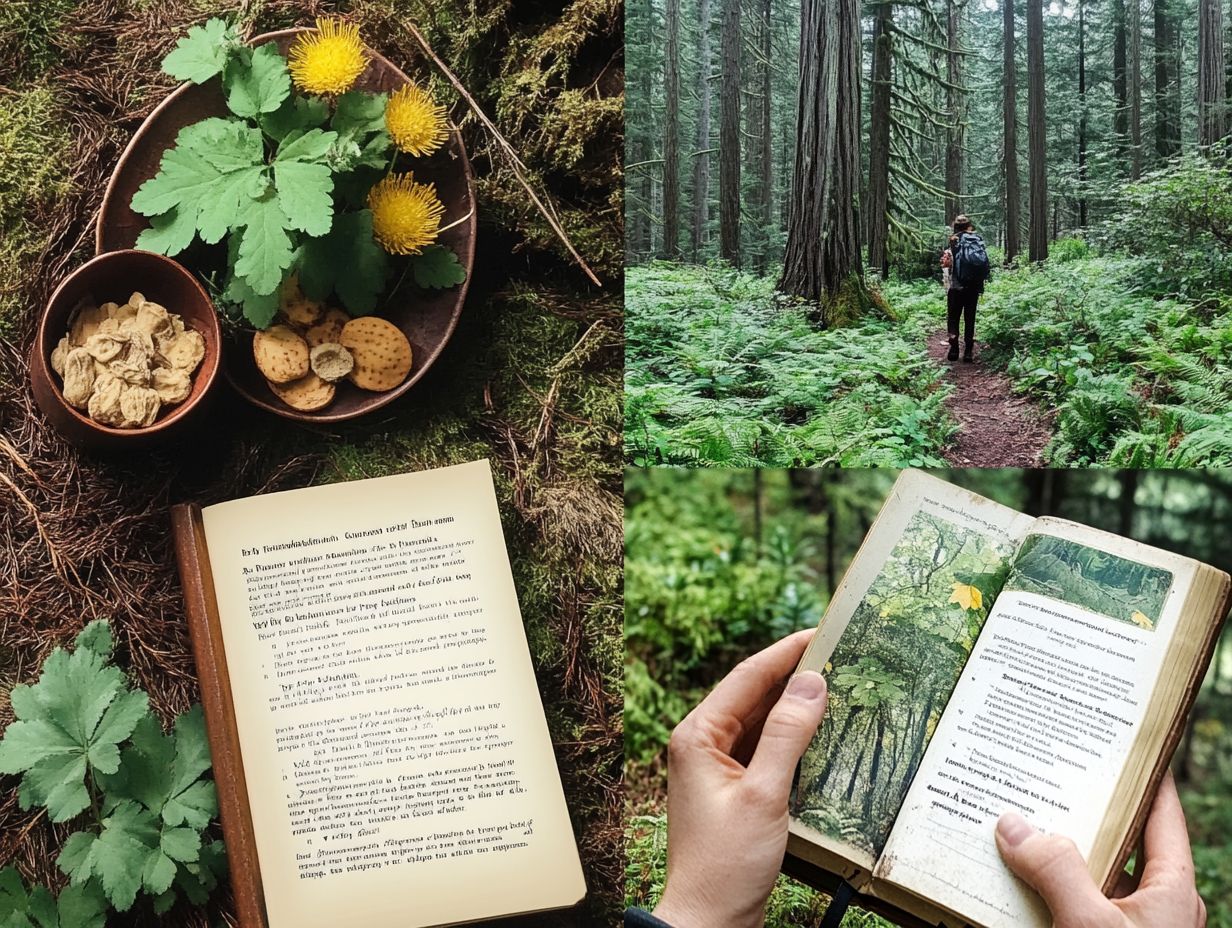
Online forums and communities, like those on Facebook, Reddit, and YouTube, offer a dynamic platform where you can dive into the world of foraging and connect with other enthusiasts.
Here, you ll find a treasure trove of knowledge, resources, and experiences that foster community engagement and support among wild food enthusiasts from all walks of life.
These platforms spark vibrant discussions, allowing seasoned foragers to share helpful tips on safe foraging and foraging guidelines.
You ll learn to recognize edible plants and wild mushrooms while avoiding their harmful lookalikes.
Take, for example, the popular Reddit thread ‘r/foraging’, where informative posts abound about local species, accompanied by user-generated content such as plant identification guides.
YouTube channels dedicated to foraging often feature exciting videos that show you how to ethically harvest wild foods and incorporate preservation techniques, underscoring the importance of sustainability.
These resources not only enable you as a beginner but also cultivate a sense of accountability within the community, promoting responsible practices.
Don’t miss out on the vibrant discussions happening now!
5. Books and Publications
Books and publications on foraging, including detailed field guides and wild food cookbooks, are essential resources for both beginners and seasoned enthusiasts.
They offer invaluable insights into plant identification, seasonal foraging, and the traditional uses of wild edible plants.
Among noteworthy authors, Samuel Thayer’s works shine for their rich detail and practical advice on identifying native plants. Meanwhile, John Kallas provides a comprehensive exploration of wild edibles and their traditional uses, focusing on culinary applications.
By immersing yourself in these foraging books and texts, you can significantly elevate your skills, learning to distinguish between similar species and uncovering the best cooking methods to showcase the unique flavors of wild ingredients.
These resources also emphasize the importance of sustainability and ethical foraging practices, including food preservation. Dive into these resources today and discover the joy of foraging!
What Is Foraging and Why Is It Regulated?
Foraging is the art of gathering wild edible plants and mushrooms from nature s bounty. It requires a solid grasp of foraging guidelines, regulations, and safety protocols. This knowledge not only ensures responsible harvesting but also bolsters food security and promotes environmental sustainability through ethical foraging practices.
In today s world, foraging is significant as it creates a vital connection to local ecosystems and supports food security while offering a sustainable source of nutrition. As food insecurity becomes a pressing issue, learning how to spot wild edibles can enhance your diet and cultivate a deeper appreciation for biodiversity, or the variety of different plants and animals in an area.
The regulations surrounding foraging are designed to protect natural resources and ensure the well-being of both foragers and the environment. If you’re curious about how to deepen your knowledge, you might ask yourself, how can I learn more about foraging? By following these guidelines, you play a crucial role in preserving delicate ecosystems while safeguarding your foraging activities. This ensures they remain safe and sustainable for generations to come.
What Are the Different Foraging Laws and Regulations?
The various foraging laws and regulations differ by region and can greatly influence your wild foraging practices. It’s crucial for you to stay informed about local environmental guidelines and foraging workshops and classes to protect ecosystems and promote ethical foraging.
In North Alabama, for example, specific laws outline what you can harvest and when. Understanding seasonal restrictions and protected species is essential. These regulations are not just bureaucratic red tape; they aim to conserve biodiversity and protect wild plants. This ensures that you don t unintentionally damage delicate habitats.
You ll also need to consider obtaining permits for certain activities, especially when mushroom foraging. This highlights the importance of awareness and compliance. Ignoring these legal frameworks can result in hefty fines and jeopardize community efforts to sustain local ecosystems. It s crucial to educate yourself now and engage responsibly in this rewarding pursuit.
Staying Updated on Foraging Laws
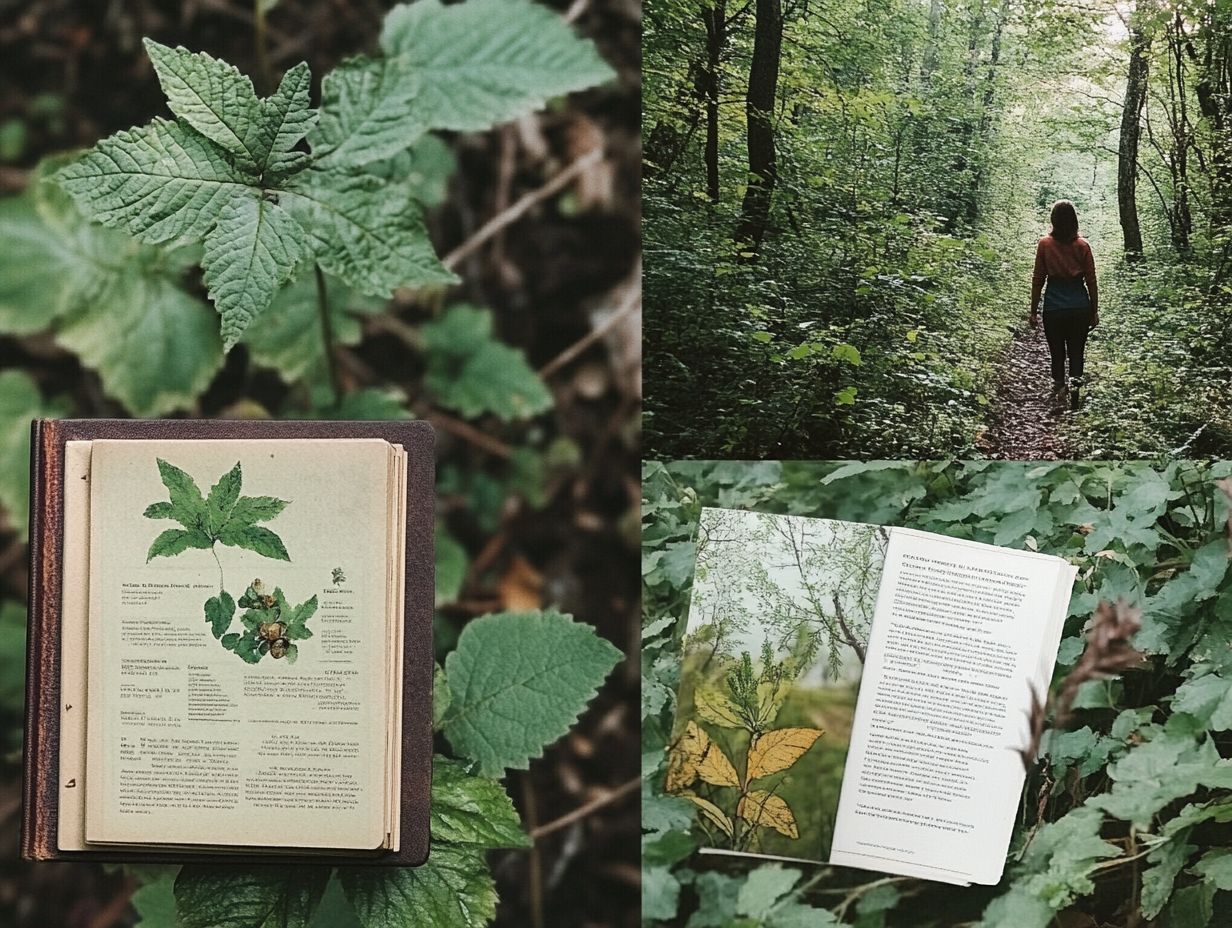
Staying updated on changes to foraging legislation and local laws is essential for ethical foraging. You can achieve this by actively engaging with online groups, such as Facebook and Reddit, local foraging communities, and exploring resources that can help you with foraging to monitor legislative adjustments related to wild foraging practices.
Subscribing to newsletters from reputable foraging organizations will provide you with valuable insights and timely updates about edible plants and legal guidelines. Following dedicated social media accounts can also be a game-changer, as they frequently share crucial information and community experiences.
Participating in online forums or local meetups opens the door to discussions about foraging practices, laws, and ethics, allowing you to learn directly from seasoned foragers. By joining these communities, you foster a sense of accountability and promote the sharing of knowledge. This ultimately enriches your overall foraging experience.
What Are the Consequences of Violating Foraging Laws?
Violating foraging laws can lead to serious consequences, including legal penalties, loss of foraging privileges, and negative impacts on local ecosystems. This highlights the importance of adhering to ethical foraging practices and sustainable harvesting guidelines.
The penalties you might face can vary significantly, ranging from hefty fines to more severe legal repercussions, depending on the gravity of the violation. For example, harvesting protected species or foraging in restricted areas can result in substantial financial penalties or even criminal charges.
These infractions can restrict community access to wild food resources, as overharvesting may deplete local populations of plants and fungi. This not only affects individual foragers but also threatens the delicate balance of the ecosystem. Embracing sustainable practices is vital, not just for your personal benefit, but for the preservation of the environment for future generations.
Are you ready to start foraging responsibly? Join a local foraging group today!
How Can Foraging Be Done Responsibly and Sustainably?
Responsible foraging is about fair habits. Only take what you need and respect local ecosystems.
Share your knowledge with your community. This helps preserve wild edible plants for future generations.
As you explore green landscapes, develop a keen eye for plant identification. Learn to tell the difference between look-alikes to ensure you pick the right species.
Always seek permission when foraging on private lands. Stay updated on local regulations that protect certain species.
Join local foraging groups to enhance your experience. This deepens your understanding of the area’s plants and animals.
Participating in workshops fosters a sense of stewardship. This ensures that these precious resources thrive and remain accessible for future foragers to enjoy.
What Are Some Common Misconceptions About Foraging Legislation?
Common misconceptions about foraging laws can cause confusion. Some may think all wild food is free for taking.
Others might believe regulations are overly restrictive. It s essential to engage with the community for clear information.
These misunderstandings expose you to potential penalties. They can also harm local ecosystems through overharvesting or disrupting animal habitats.
Community leaders should share accurate information about legal foraging. This includes what can be foraged and how to do it sustainably.
By organizing workshops and informational sessions, they can enrich understanding. This proactive approach fosters respect for nature.
It helps ensure that wild food remains a valuable resource for generations to come.
Frequently Asked Questions
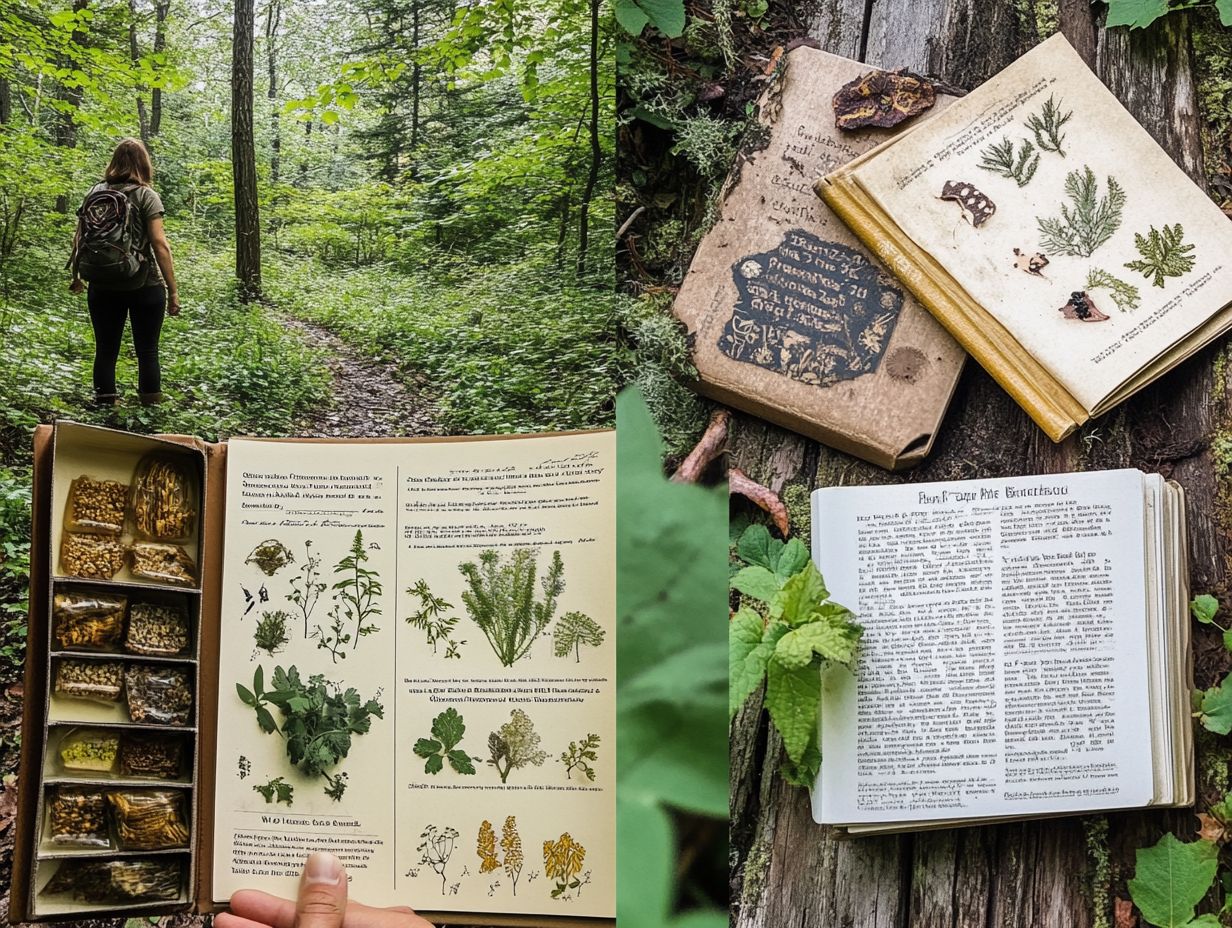
What is foraging legislation?
Foraging legislation refers to laws that govern the collection of wild plants, mushrooms, and other natural resources from public or private land. To ensure you’re following the rules, it’s important to know how to research local foraging regulations.
Why is it important to learn about foraging legislation?
Learning about foraging legislation ensures you forage legally and safely. Understanding the rules helps protect the environment and endangered species. For more insights, check out these websites for local foraging information.
What are some common foraging restrictions?
Common restrictions include limits on quantities, designated foraging areas, and prohibited species. Some areas may require permits or licenses.
What are some resources for learning about foraging legislation?
Resources include government websites, foraging organizations, educational courses, books, and local groups focused on sustainable foraging.
Are there any online courses specifically for foraging legislation?
Yes, there are online courses available that specifically cover foraging legislation. An example is the Foraging Training Course offered by the Institute of Forager Education, which can complement the best local resources for foraging safety.
Is it necessary to obtain a permit or license for foraging?
This depends on local laws. It’s important to research and understand the requirements in your area to avoid legal issues.

